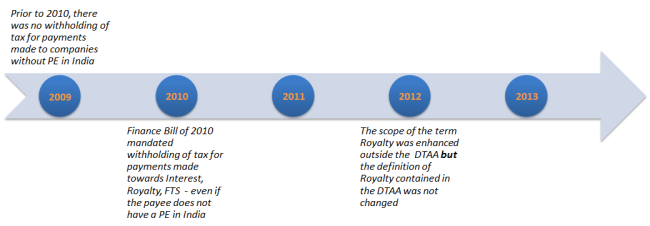There are quite a few Indian start-ups that use the Amazon Web Services for their computing needs. We happen to be one among them. Unfortunately, there is a lot of confusion about withholding taxes (TDS) on payments made to AWS. I am writing this article to share my findings on this topic.
Now, coming back to the question, should you withhold tax?
Short answer: No
If you like to know why we think so, please read further…
AWS does not have a permanent establishment (PE) in India. They are incorporated in the US. For companies that do not have a PE in India but have one in another country, the tax rules apply as per the Double Taxation Avoidance Agreement or DTAA, provided India has a DTAA with that country. India has signed the DTAA with many countries, including the US. This makes AWS a beneficiary of the DTAA that India has with US.
AWS too, is clear that they are not liable to pay taxes in India. What this means to a start-up is that AWS will not allow you to pay any amount lesser than whatever you have been billed for. If a start-up withholds any tax, it is an additional expense on the start-up that is utilizing AWS services.
-
If you were to be doing business with any company without a PE in India before 2010, then no tax would be applicable whatsoever. This was true of AWS as well.
-
The Finance act in 2010 changed things a bit (and some of these were retrospective amendments). It was announced that for following three categories TDS is applicable, even without a PE :- Income by way of Interest Payable
- Income by way of Royalty
- Income by way of Fees for Technical Services
-
The payment we make to AWS cannot be classified either as Interest or as Royalty (as per the then definition of these categories). The only other option is FTS – Fees for Technical Services.
-
Time and again, the Income Tax Appellate Tribunal (ITAT) has ruled that FTS is applicable only when the service is rendered by a human – there should a person working for you at the other end (think freelance programming, think consulting). Robots and Machines do not fall under this definition – and AWS is a machine rendered service. The ITAT ruling in the case of made this amply clear.
-
Again, in the year 2012, the scope of the term Royalty was significantly enhanced. This caused further debate and questions arose if tax had to be withheld under the new definition of Royalty.
-
But the DTAA (of which AWS is a beneficiary) still retains the pre-2012 definition of Royalty and this overrides any other definition found elsewhere, particularly when dealing with companies covered under the DTAA. This article should make it clear. So, AWS payments still remain out of the Royalty net.
- In summary, payments made to AWS cannot be classified as Interest payments, FTS or Royalty. For withholding tax under any other category other than these, it is mandatory to have a PE in India. As I have mentioned earlier, AWS has no PE in India. This implies that we are not liable to withhold any taxes for payments made to AWS.
AWS has the documents necessary to support the fact that they do not have a PE in India and that they are a resident of the US for the purpose of taxation. If you are an AWS customer, you can contact them and they would be happy to help you.
If you bear a general interest in taxation, do check out the Pugmarks Camp for Taxation in India. And to stay informed on everything you care about, sign up for Pugmarks.
I hope this is useful. Quite a few people have helped us get so far. I would particularly like to thank Simple Tax India and of Blume Ventures. If you have other views to share, please leave a comment or write to me at aditya.com
Disclaimers:
- I am not a qualified chartered accountant. These views just represent my personal understanding of the topic. Please do your own research and/or contact a qualified chartered accountant for more information.
- Tax laws can change from time to time. Amendments can be made with retrospective effect, making you liable to pay taxes.
Aditya,
Co-founder, Pugmarks.me

This is, without a doubt, one of the clearest explanations of the situation that I have read. Thanks for taking the time to put it out there.
Yes there was a recent case law on similar facts before Kolkata Income Tax Tribunal. One can google the full text of the case here’s the citation: Income-tax Officer, Ward 12 (2), Kolkata v. Right Florists (P.) Ltd. [2013] 32 taxmann.com 99 (Kolkata – Trib.)
Thanks for clarifying this sticky issue. In connection with the same issue, wanted to know, whether you are paying service tax on these payments under the reverse charge mechanism i.e. depositing a 12.36% service tax with the Service tax department for availing these services.
Hi Pankaj, I am looking to get clarity on this issue. Shall keep you posted..
Hi Aditya, It will be great if you can give Pankaj query on service tax liability. And, it is interest to know about FEMA rules etc since some of the companies will pay online payment through credit cards.
hi aditya, would like to discuss this with you in detail.
Hi,When you make remittance to aws ,you are supposed to obtain a CA certificate.Unfortunately our CA has refused to do so under the guise that AWS services fall under Royalty as per some new definition.There is still too much confusion on the subject..Indian tax laws continue to be as confused as they were.
Paying service tax 12.36% under reverse mechanism is mandatory,Request more clarity on this on TDS though…